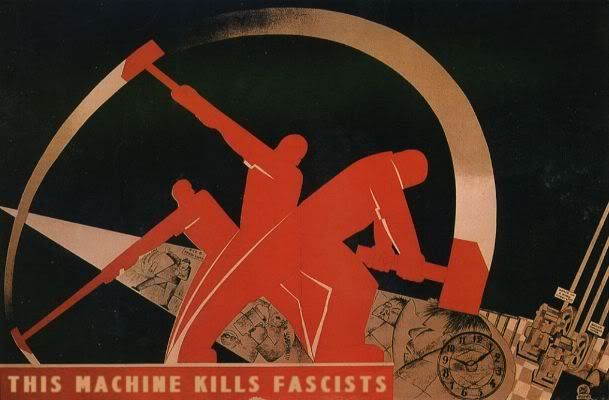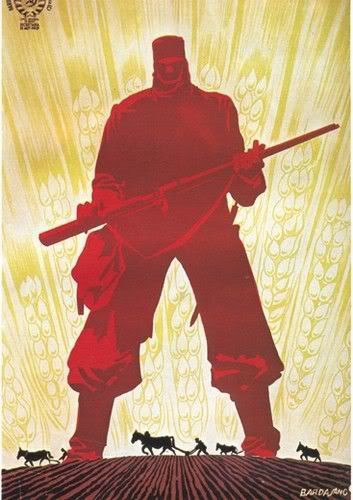Some Thoughts on Antonio Gramsci
So this year I've decided to finally make it a point to “learn” Antonio Gramsci. Before ever reading any of his work, I must admit that I had initially been quite dismissive of his ideas, largely because of the supposed links he had with the development of Eurocommunism (that pathetic attempt by various European communist parties to “revise” Marxism by scrapping notions of class struggle, refuting the imperative of capturing state power, and embracing bougeois notions of “democracy”). So far I've only just scratched surface of his Prison Notebooks, but I must say I am extremely glad that I got over my skepticism and actually began to study the work of this brilliant thinker. And I'm happy to say that all my preconceived notions were wrong.
Anyway....I recently wrote a paper incorporating some of Gramsci's ideas about civil society, so I thought I might as well post the relevant parts here for anyone wanting a very basic (and wholly insufficient) understanding of his main ideas.
---
“Gramsci & Civil Society”
According to Antonio Gramsci, the domination of the capitalist class in modern society is maintained through mechanisms of both force and consent. Gramsci argues that the ruling class not only uses the state as an instrument of class control, but also uses civil society to transmit and preserve bourgeois cultural values. In this sense, one cannot talk about “culture” in capitalist society without recognizing how it is permeated and dominated by class-driven interests. Culture is largely defined by the network of social relations that exist within society, and therefore it reflects its hegemonic arrangements. For example, a country which adopts a system of slave labor will quickly develop a racist culture that serves to justify it. Similarly, a society built around notions of the free market and private ownership of capital will inevitably adopt a materialistic value system that legitimizes vast social inequalities.
Civil society, in Gramsci's view, is a crucial element for maintaining class hegemony. He defines it as the collection of social institutions through which people organize themselves autonomously from the state to defend their common interests. Civil society thus includes employer associations, trade unions, churches, political parties, cultural groups, as well as other social actors. Gramsci argues that the bourgeoisie will make concessions to these social forces to help win the “consent” of the subordinate classes, while ensuring that such “compromise cannot touch the essential; for though hegemony is ethical-political, it must also be economic, must necessarily be based on the decisive function exercised by the leading group in the decisive nucleus of economic activity.” (1) Civil society thus serves to prevent the working class from making concrete gains by deflecting demands for reform away from the core economic areas.
In this way, Gramsci builds upon Hegel and Marx's assertion that civil society is basically the social sphere independent of the state, by arguing more concretely that the state is “only an outer ditch, behind which there [stands] a powerful system of fortresses and earthworks,” (i.e. civil society). (2) This system embodies the “'spontaneous' consent given by the great masses of the population to the general direction imposed on social life by the dominant fundamental group.” (3) Civil society and the state are thus mutually reinforcing: when the state enters a period of crisis, civil society functions as a bulwark against social upheaval, and when civil society fails in preventing social unrest, “the apparatus of the state coercive power...enforces discipline on those groups who do not 'consent' either actively or passively.” (4) These two “superstructures” work symbiotically to preserve an exploitative economic order that favors the interests of the dominant class.
However, Gramsci does not see civil society as merely an instrument of bourgeois control, even if its prevailing institutions are used to manipulate and de-radicalize workers. In fact, one of Gramsci's crucial points is that, given the pervasiveness of ruling class ideology in all aspects of life, it is absolutely necessary for people to organize their own representative institutions and produce their own “organic” intellectuals that can work to transform civil society into an alternate “hegemony” capable of confronting state power. Gramsci argues that whereas in the East, the relative weakness of bourgeois hegemony over civil society allows the proletariat to attack state power directly (what he calls a “war of maneuver”), in advanced Western societies the proletariat must engage in a protracted “war of position” in which its primary goal is to create a counter-hegemony that can uproot the embedded bougeois order. It is the task of the revolutionary party to educate and agitate among the working class to bring about this shift in popular consciousness.
Notes:
(1) Gramsci, A (1971). Selections From the Prison Notebooks. In Q. Hoare and G. N. Smith (eds.) Lawrence and Wishart, London, 161.
(2) Ibid, 238.
(3) Ibid, 12.
(4) Ibid, 12
---
For those of you who wish to learn more about Gramsci, I suggest reading
"An Introduction to Gramsci's Life and Thought” and studying some of his writings at the
Marxist Internet Archive.


